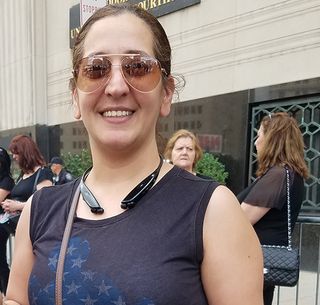David Brown & Usman Khan
The deportation of roughly 200 Iraqi nationals, predominantly Chaldeans, in the Detroit area was halted Monday when the Eastern Michigan District Court expanded a Detroit area stay to affect detained Iraqi immigrants nationwide. However, without a further decision deportations will resume on July 6.
Friends and family members have been holding protests outside the federal courthouse in Detroit in defense of the immigrants, many of whom came to the country as children and have spent decades living and working in the US.
Initially, 114 immigrants were detained in the Detroit area as part of a broader Immigrations and Customs Enforcement (ICE) sweep on June 11. Since then at least 80 more have been arrested nationwide. An ICE spokesman told reporters that as of April 17, there are final removal orders for a total of 1,444 Iraqi citizens living in the US.
While the Detroit ICE office told MLive that these deportations “address the very real public safety threat represented by criminal aliens,” family members and protesters who gathered outside the courthouse last week described those detained as ordinary people with minor offenses.
Diana Hormez, whose brother was recently detained, spoke to the WSWS: “My brother got snatched at that time because he had some minor legal offenses against him. He’s worked in construction and in a party store which his friend owned. He’s a great guy.”
 Diana Hormez
Diana Hormez
Like many of the immigrants, Hormez’s brother has lived in the US for decades and has built a life. “He has been living in the US since he was 3 years old,” she said. “He came over here on a visa. He’s now 40 years old and he has children.”
Hormez explained that being arrested as a teenager has haunted him ever since and prevented him from becoming a citizen:
“He has had problems but he has never run away from the consequences of what he did. He has served his time in jail, he has done parole, and he has gone to the immigration office once a month, every month, like he is supposed to. My brother’s not a murderer. He has been trying for so long to get his citizenship but because of his legal offenses he was never able to get it. My father got his citizenship and I was born here so I’m a citizen but my brother has not been able to get his citizenship.”
Many of those arrested were sent to detention facilities hours away in Ohio, but may be sent even further from their families. “They are taking many of the people they picked up, from the facility in Youngstown, Ohio, where they are currently being held, and they are moving them to facilities in Louisiana and Arizona,” Hormez said. “Apparently, that’s the next step before they get deported. The ACLU intervened and managed to get them to stop the deportations for now but it is just a temporary measure.”
The initial stay was granted on June 22 in response to a petition from the detainees, citing the Immigration and Nationality Act and the Convention Against Torture, as legally barring their deportation to a war zone where their “life or freedom would be threatened.”
 A protest of Iraqi immigrants in Detroit
A protest of Iraqi immigrants in Detroit
Instead of arguing that the detainees could be legally deported, the US government argued that the District Court has no jurisdiction and detainees could only have challenged their deportation by appealing their final removal order when it was issued. In some cases the final removal orders were issued over a decade ago, well before ISIS seized Northern Iraq and specifically targeted Chaldeans and Kurds.
In March, the Iraqi government agreed to accept deportees from the United States in exchange for being removed from the Trump administration’s travel ban. The travel ban was initially stopped by lower courts, but the Supreme Court decided unanimously Monday to allow the Trump administration to implement the ban, with minor adjustments, prior to a final ruling.
The current district court decision halting deportation to Iraq is only a temporary reprieve. The support of the “liberal” wing of the Supreme Court for Trump’s discriminatory measures on the basis of “national security” demonstrates the inability of the highest court to defend basic constitutional and democratic rights.
No comments:
Post a Comment